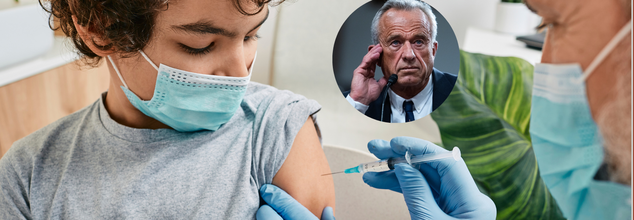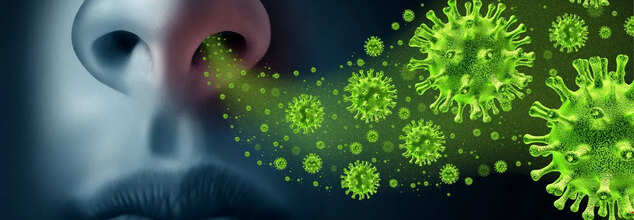
Can Robert F Kennedy Jr's Anti-Vaccine Agenda Make America Contagious Again?
With over 250 cases of measles spreading across Texas, Oklahoma, and New Mexico, and the epicenter of the outbreak merely 120 kilometers away from Lubbock, she’s battling to shield her community from an aggressively contagious virus.
Yet, amid the rising number of infected children—many requiring critical care—there’s a growing fear that America’s already fragile vaccine infrastructure is being deliberately dismantled. And at the heart of this unraveling system lies Robert F. Kennedy Jr., the new Secretary of Health and Human Services (HHS), whose controversial stance on vaccines is now shaping federal health policy.
Since assuming office, Kennedy has overseen a drastic $2 billion funding cut to vaccine support programs—particularly those that shield vulnerable children. These cuts have forced local health departments to lay off critical staff, cancel outreach clinics, and shut down educational efforts at a time when immunization rates are dipping alarmingly across the country.
In Lubbock and other affected areas, each new measles case now risks community-wide transmission due to weakened immunization networks. These consequences are not coincidental. The infrastructure that moves vaccines from federal stores to the arms of children—comprising data systems, nonprofit coalitions, and health departments—has been systematically eroded.
Public trust, already shaken by years of pandemic-era misinformation, is deteriorating further. With Kennedy at the helm, the federal government has not only slashed support but actively downplayed the outbreak’s seriousness, deflected responsibility, and delayed effective response measures.
From Conspiracies to Consequences: Kennedy’s Anti-Science Playbook
Robert F. Kennedy Jr. is no stranger to anti-vaccine rhetoric. His track record is studded with misinformation, including debunked claims linking childhood vaccines to autism and his flirtation with conspiracy theories about chem trails and HIV/AIDS denialism. Many believed that his confirmation as HHS secretary under Donald Trump would mark a pivot toward moderation, especially after public promises not to eliminate vaccine access.
However, less than two months into his tenure, Kennedy's actions are telling a different story. He’s blocked the release of pro-vaccine data, cancelled vaccine advisory meetings, and laid off scientists and professionals crucial to outbreak response. His public messaging undermines the importance of immunization while giving a platform to unproven and potentially harmful treatments like vitamin A regimens—despite no significant vitamin A deficiencies being present in most of the US population.
Ripple Effects of Misinformation
As the measles outbreak surges—now the worst the US has seen since 2019 with nearly 500 cases and two child fatalities—the impact of Kennedy’s agenda becomes increasingly evident. During previous administrations, even under Trump, federal leaders encouraged vaccination to control outbreaks. Kennedy has taken the opposite route, promoting skepticism while the virus finds new victims.
Epidemiologists warn that the US could be facing an explosion in measles cases, with predictions in the tens of thousands. Michael Mina, a respected voice in infectious disease research, warns that measles may not just cause death and illness but also compromise survivors’ immunity to other diseases by wiping out preexisting antibodies.
One of the most telling signs of this crisis is the national decline in measles vaccination rates. To maintain herd immunity, a 95% vaccination rate is essential. In the 2019–2020 school year, 20 states met that target. Today, only 11 states remain above that threshold, while 14 have dropped below 90%. This rapid erosion sets the stage for recurring outbreaks—undoing decades of public health success.
This is not an isolated crisis. The cuts at HHS and Kennedy’s fringe views threaten broader health initiatives. His department is even scaling back on HIV response efforts, despite former promises by Trump to eradicate the virus entirely. Kennedy’s past statements blaming drug use for AIDS are now more than fringe theories—they’re seeping into national policy.
Recognizing the looming threat, 23 states and Washington, D.C. have taken the extraordinary step of suing the Department of Health and Human Services over the funding cuts. On Thursday, a federal judge intervened, blocking the move and citing “voluminous” harm to health departments. Yet, for many communities already impacted by the ongoing measles outbreak, the damage may already be unfolding.
Kennedy’s tenure has sparked what many public health advocates consider a public health regression. By undermining science, promoting conspiracies, and dismantling infrastructure, the United States risks becoming vulnerable to diseases it once had under control.
Could History Be Repeating Itself?
The threat posed by RFK Jr.’s vaccine agenda is not theoretical—it’s measurable in hospital admissions, in lost public trust, and in the faces of health workers trying to protect their communities with fewer tools and less support. His policies may reshape America’s health landscape for years to come, leaving it more exposed to outbreaks and less prepared to respond.
If the country is to regain its footing, it will take more than court interventions and scientific rebuttals. It will require a renewed commitment to public health, science-based leadership, and national acknowledgment that the true cost of fringe beliefs is not just ideological—it’s measured in lives.

Image Credits: Canva
Man Dies From Brain Damage After Drinking Just One Sip Of Rotten Coconut Water
What was meant to be a refreshing drink from a tropical delight became a medical disaster for a 69-year-old man in Aarhus, Denmark. Following the ingestion of only a small quantity of coconut water from a rotten coconut, the man developed sudden onset of severe symptoms that resulted in his death within 26 hours of admission. This startling case, reported in a recent scientific study and widely debated in the international medical community, highlights a lesser publicized but potentially deadly foodborne hazard- fungal neurotoxins.
This is not merely an isolated event—this is a wake-up call for consumers and food safety agencies around the world, especially as pre-packaged and fresh fruits and vegetables become increasingly popular in home kitchens as well as tourist destinations.
The Danish man, whose name has not been released, bought a pre-hydrated coconut about a month ago. Left at room temperature on his kitchen table, the coconut had obviously spoiled. When he drank the water through a straw, the man quickly detected a bad flavor and discarded the coconut after examining its slimy, rotten center. Sadly, that one sip was enough.
Within a span of three hours, the man came down with a high fever, profuse sweating, and vomiting. Emergency workers encountered him pale, confused, and unbalanced—symptoms indicative of acute neurological distress. He was taken to the hospital, where an MRI confirmed massive brain swelling. Despite intensive treatment and a diagnosis of metabolic encephalopathy (a state in which the brain is impaired by chemical imbalances), his condition quickly deteriorated. He was pronounced brain dead just more than a day later.
Ssuspicions fell initially on the known food toxin bongkrekic acid, but continued study and tests revealed a sinister culprit: a fungus, Arthrinium saccharicola, in the man's windpipe and also in the rotting coconut.
This is a rare fungus, which produces 3-nitropropionic acid (3-NPA), an agent that is known to be highly neurotoxic. The toxin has the effect of breaking down the production of cellular energy in the brain, causing rapid swelling, loss of brain function, and death in extreme conditions. Importantly, there is no antidote for 3-NPA; supportive treatment is only offered, and this is centered on symptom management like encephalitis, seizures, and metabolic imbalance.
What's even more worrisome is that it wasn't much coconut water that triggered this effect. It only needed an infinitesimal dose of the toxin from the fungus to be devastatingly detrimental to the brain.
The toxicity of 3-NPA is not new. Chinese and some African medical journals have reported poisonings since the early 1990s. In all such cases, moldy sugarcane was the source. Patients experienced gastrointestinal upset—vomiting and diarrhea—followed by neurological symptoms such as confusion, seizures, and coma. In some cases, the illness was fatal.
This Danish case is the first reported instance linking Arthrinium saccharicola to spoiled coconut water, and as such, it is a highly unusual and alarming case of how this toxin can appear from various food sources based on storage and environmental conditions.
Why Refrigeration Isn't Optional for Food Safety?
Experts now want consumers to rethink how they store coconuts and other perishable fruits. Dr. Samuel Choudhury, a Singapore-based medical influencer with more than 300,000 followers, stressed in an Instagram post the need to keep pre-shaved coconuts refrigerated. "Always keep these coconuts in the fridge since they are already partially peeled," he explained. "Only whole coconuts should be kept at room temperature."
The outer husk of intact coconut serves as a natural covering, slowing down spoilage. But when shaved or pierced, the exposed white interior becomes very vulnerable to microbial and fungal invasion. Left on the kitchen counter, these coconuts will ferment, spoil, or acquire toxic fungi—without any signs of mold or warning until too late.
Significance of Consumer Awareness
Although coconut water is touted for its hydrating qualities and is a common staple in most tropical diets, this particular instance points to the potential dangers of mishandled or stored improperly natural drinks. With the worldwide trend towards fresh, unprocessed foods, education for consumers becomes increasingly vital.
Health officials all over the world are taking heed. In the wake of the incident, European food safety networks have reaffirmed requiring explicit labeling of fresh coconut products, such as expiration dates and storage in refrigerators.
Even a sip of improperly stored coconut water can prove deadly due to rare fungal toxins. Always refrigerate partially peeled or pre-shaved coconuts, consume them within a few days, and discard anything that tastes or smells off. When in doubt—throw it out.

Credit: Canva
Australians Encouraged To Get Flu Shots As Temperatures Drop
Australian health authorities are encouraging residents to get their flu shot as cases surge nationwide, with one state seeing numbers nearly double. According to the National Notifiable Diseases Surveillance System, over 46,300 flu cases were recorded across Australia by the end of March this year—a rise of approximately 50 per cent compared to the same period last year. The data revealed that 67 people in Queensland had been hospitalised due to influenza, and 900 new cases were confirmed within a single week. Meanwhile, in Victoria, more than 10,000 flu cases have been reported so far, with numbers continuing to climb—almost double compared to the same time last year.
April Is The Right Time To Get Flu Shots: Authorities
It is pertinent to note that Australia is located in the southern hemisphere and is currently moving towards the much-dreaded winter season. While winters are not directly linked to influenza and related diseases, they create conditions that make it easier for flu viruses to spread and for people to become infected.Victorian Chief Health Officer Tarun Weeramanthri told the leading Australian news publication Nine, that April is the ideal time to get vaccinated before flu season peaks in June and July. "It does take a couple of weeks before those antibodies come into your body and give you that protection – so you'll get peak protection if you go out and get vaccinated now," he explained. A spokesperson from the Australian Health Department warned that the flu poses a serious threat to babies, young children, and those with underlying health conditions. Vaccination is available to everyone over six months of age.
“It can require hospitalisation and can cause death,” the spokesperson said. “Vaccination is a safe and effective way to protect yourself and your family from serious disease caused by influenza.”
Who Should Get Vaccinated?
The Australian Government recommends that everyone over the age of 6 months has an influenza (flu) shot every year. Categories which particularly need to get jabbed include children aged six months to five years, pregnant women, individuals over 65, and those with medical conditions.What Is Flu? What Are The Symptoms?
Flu, or influenza, is a contagious viral infection that targets the respiratory system of a person. However, many confuse it with the common cold. While flu and the common cold can have similar symptoms, like runny nose and cough. But cold symptoms are usually mild and flu symptoms can be severe and lead to serious complications. Different viruses cause colds and the flu.Key symptoms include:
- Fever
- Chills
- Cough
- Sore throat
- Stuffy nose
- Body aches
- Headaches

6 Test Positive For Measles In Texas As RFK Jr Touts Vitamin A As Possible Cure
Six young children at a Lubbock, Texas, day care center have tested positive for measles—a dreaded scenario with the potential to accelerate an already out-of-control outbreak that has spread to at least two other states. More than a dozen other states and Washington, DC are dealing with cases of measles unrelated to Texas. As per the Centres For Diseases Control And Prevention (CDC), 22 jurisdictions have been hit by measles as of now.
On Friday, the Texas Department of State Health Services said the toll rose to 481 confirmed cases, a 14% jump over last week. Fifty-six people have been hospitalized in the area since the disease started spreading in late January.
What Do We Know About The Case In Texas?
Measles outbreak in Texas began on March 24, when a little girl at Tiny Tots U Learning Academy, who had been sick with fever and vomiting tested positive. She later needed to be hospitalized for pneumonia and trouble breathing. Kids who have tested positive at the day care so far are between the ages of 5 months and 3 years old, said Maegan Messick, a co-owner of the center. None was fully vaccinated against measles.
For nearly two weeks, Messick has been working with local health officials who are in contact with the Centers for Disease Control and Prevention about the situation. Messick said she’s not been given clear guidance on how to handle measles in such a large day care with so many vulnerable kids. "From what I’m being told, the CDC doesn’t have a playbook for this," Messick said. "We’ve just had to make judgment calls."
How Is US Dealing With Measles?
Donald Trump lead US is facing the largest measles outbreak in six years, but the CDC has remained relatively silent on the public health threat, providing just weekly updates on its website and sending an alert to doctors last month. The agency sent 2,000 doses of the MMR vaccine to Texas health officials at their request but hasn't held a news briefing about measles since 2019, when two large outbreaks in New York threatened to reverse the United States’ status of having eliminated the virus.
RFK JR Suggests Vitamin A As Possible Treatment, Posioning Reported
Meanwhile, United States Secretary of Health and Human Services Robert F Kennedy Jr has touted Vitamin A as a potential treatment option against measles. For decades, RFK Jr has been openly discrediting vaccines, linking them to Autism and other diseases. On Friday, it was reported that children who were infected with measles and given Vitamin A in Texas were found to be suffering from liver toxicity. Speaking to USA Today, Dr Lara Johnson, a pediatric hospitalist and chief medical officer of the Covenant Health-Lubbock service area, stated that all the children underwent routine lab testing, which showed abnormal liver function believed to be caused by Vitamin A toxicity.
How To Identify Measles?
First symptoms show after 7–14 days after a measles infection. They include:
- High fever (may spike to more than 104°)
- Cough
- Runny nose (coryza)
- Red, watery eyes (conjunctivitis)
- 2–3 days after symptoms begin: Koplik spots
- Tiny white spots (Koplik spots) may appear inside the mouth two to three days after symptoms begin.
Measles rash appears 3 to 5 days after the first symptoms. It usually begins as flat red spots that appear on the face at the hairline. They then spread downward to the neck, trunk, arms, legs, and feet.
- Small raised bumps may also appear on top of the flat red spots.
- The spots may become joined together as they spread from the head to the rest of the body.
- When the rash appears, a person's fever may spike to more than 104° Fahrenheit.
© 2024 Bennett, Coleman & Company Limited

